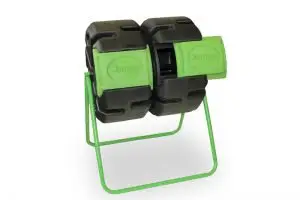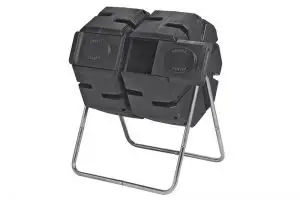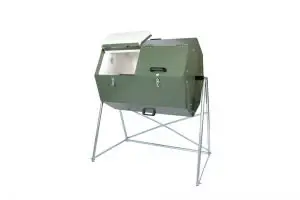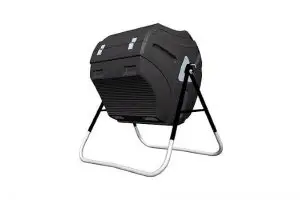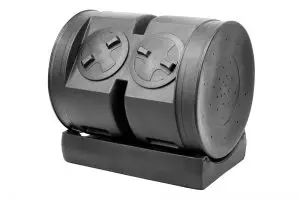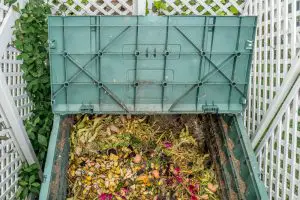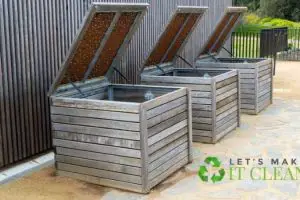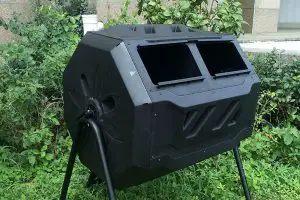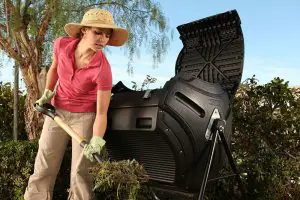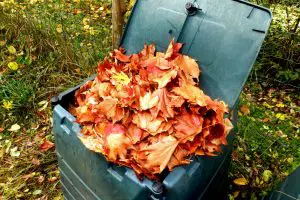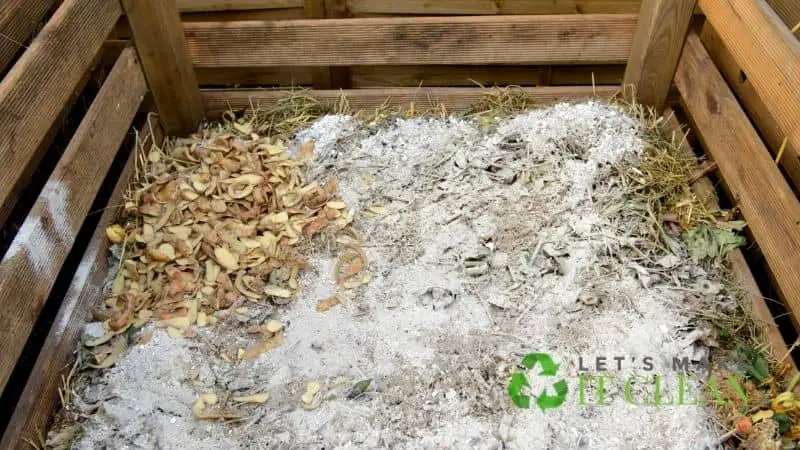If you want to find out the size of the composter you need, here is a detailed article with the factors that determine your ideal size.
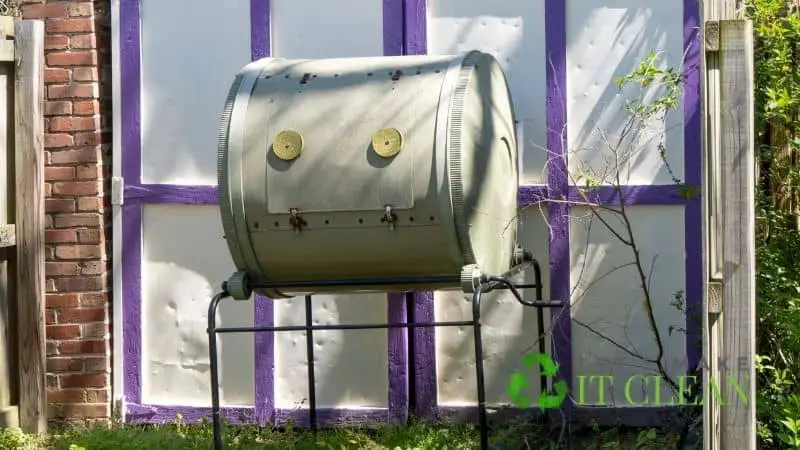
Have you decided to start composting your kitchen waste and other garden waste? Have you assessed your situation and settled on a tumbler as your composting method?
Quick Navigation
After choosing the tumbler for your process, the next step involves selecting the right size for you. You’ll find compost tumblers in the market in different designs. Some will roll on the ground, others are crankled using a handle, others have a central axle on which they rotate.
So, should you consider taking a tumbler instead of compost bins? If yes, which is the right size?
What Is a Compost Tumbler?
Compost tumblers are also known as “batch” composters. They have a rotating drum that you spin by cranking the unit itself or by using a handle.
Tumblers can come with one or two chambers that you fill using scraps and other food waste. The dual-chamber feature is a significant selling point for tumblers as it speeds up the process.
One factor that slows down the composting process is mixing fresh ingredients with already seasoned compost in the tumbler.
The dual-chamber feature enables you to put the fresh organic materials in one chamber as composting continues in the other chamber. You fill the chambers and close with a lid and leave the batch to mature before you can take it to your garden or yard.
Tumbler is a barrel that you make using recycled plastics, and you can fill it using kitchen wastes and organic yard. The process dates back thousands of years ago, and you cannot tell when the first compost tumbler was made.
Tumblers are different from compost bins as compost bins are set on the ground, and they have an open bottom. Compost bins make it challenging to turn the materials using a fork. A compost aerator will help a lot in this process.
For a compost bin, pests can also find their way into the composting material through the opening at the bottom. Not to mention that the openings also cause heat to dissipate, which slows down the compost-making process.
If you live in an urban setup and are passionate about compost making, you are better off with a tumbling device as it is sleek and attractive. Its clean operation also makes it a perfect choice for urban houses.
Unlike other methods, compost tumblers are designed to minimize odors. Its closed design helps to prevent any smell from escaping.
Factors to Consider When Settling on the Size Of compost Tumbler
What you want to do with your composter will determine the right side of the tumbling composter. For instance, will you be composting food waste from your kitchen (see kitchen compost bin reviews)? Or do you have a big garden full of grass, shrub trimmings, and farm waste?
For a family of four members, a 7.5 cubic ft composter can be enough. If you have a small yard, the 9.5 cubic ft tumbler will be ideal. If you have a school, restaurant, big vegetable garden, or lawns, you are better off with a 12 cubic or 15 feet cubic ft tumbler.
Compost tumblers have a capacity of around 4 to 15 cubic ft though some go up to 20 cubic feet. The size is smaller than that of most compost bins that range from 7 to 20 cubic feet.
Tumblers are smaller than compost bins. A big size would make it difficult to spin and mix the materials.
Compost Bin vs Tumbler, Which Is Best?
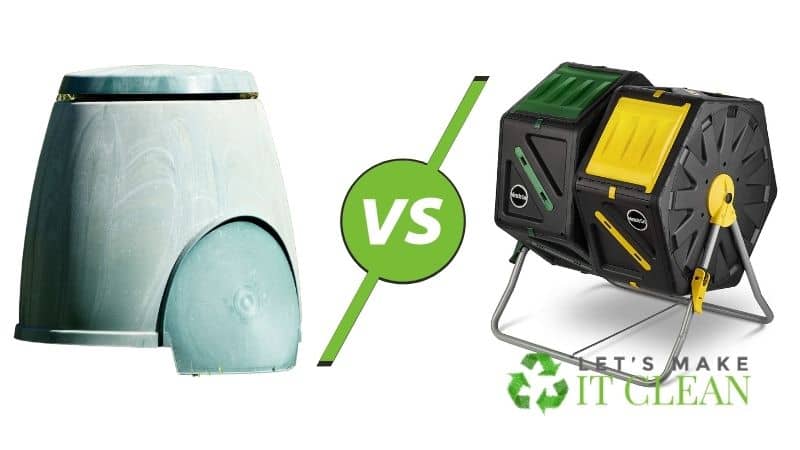
Compost Bin
Pros
- Carries a large volume of compost ingredients
- Readily drains excess moisture
- Cheaper than a tumbler
Cons
- It is a challenge accessing finished compost
- It can attract and harbor pests
- The thinner plastic can become brittle
Compost Tumblers
Pros
- Sturdy construction that will last for years
- The continuous use models help to keep fresh ingredients from seasoned compost
- Sealed and aerated to speed up the compost making process
- Pest proof
- Seamless and effortless to access finished tumbling compost
Cons
- Costs more than compost bins
- Some models are a challenge to spin when full
Read also: Compost Tumbler vs. Worm Bin
Are Compost Tumblers Better Than Compost Bins?
When faced with a compost bin vs. tumbler situation, first look at the cost. Tumblers may cost you more than compost bins.
Despite the higher price, a compost tumbler is better than a compost bin in various aspects, including:
1. Functionality
Compost tumblers have a design that makes it easier to turn the materials compared to compost bins. It saves you time since you only need to spin it a few times a week.
The composters are also easier to empty than compost bins. If the process of making compost is complete and there is no raw material, place the wheelbarrow under the composter so that the finished compost can get direct in.
The composters are also popular as they make it possible to compost materials that are ordinarily considered taboo. These include fat, fish, meat, etc.
The materials are known to attract pests, and they also take time to decompose. The high temperatures in the composter make it possible to break down the food waste quickly.
The composter is ideal if you have large quantities of sappy materials and grass clippings to compost.
Too much grass and lawn clippings and other green materials in a compost bin or compost heap may result in anaerobic composting, which produces an unpleasant smell.
Additionally, they allow for easy air circulation, which helps deal with the anaerobic issue. However, you still need brown ingredients which are rich in carbon, to make the process successful.
2. Durability
In terms of durability, compost tumblers are more durable than compost bins. They have a heavy construction, which allows them to hold the organic matter’s weight, including food scraps from your kitchen waste.
Ensure the legs and axle can hold up for years. If the device comes with handles, gardeners should ensure they are not flimsy.
On the other hand, bins are not as durable as they have thinner plastic construction. The plastic cans become brittle with years of use or during cold weather, or exposure to sunlight.
3. Composting Time
Composting tumblers speed up the composting process by ensuring more heat and better aeration for the composting materials. The tumblers can finish the process in half the time taken by the composter bin.
When tumblers are spun, you can mix more fresh matter. This can slow down the composting process.
Alternatively, you get a composter with a dual chamber. The dual-chamber design enables you to have the fresh materials in one chamber and the seasoned compost in the next.
The most level of the composter is also a vital factor in the process. The most contributions coming from wet leaves, kitchen scraps, and farm waste need to balance the brown materials.
Some tumblers’ models come with drain holes and a collection chamber that helps collect the compost tea. Tea is rich in nutrients, and it is an excellent fertilizer.
The key to optimizing the time is painting a proper balance of the nitrogen/carbon ratio. You should also maintain damp but not wet moisture content.
4. Pest Control
If you are having a challenge with rodents, tumblers will be a better choice. It helps keep rodents such as rats and mice away, while a compost bin keeps dogs and raccoons away.
The compost tumblers are fully sealed, which makes it 100% proof of pests. It is also raised from the ground, which makes it hard for the pests to access it.
5. Odor Control
Both the tumblers and compost bin control odors. If you lift the lid, you’ll get a composting smell that is not unpleasant. When you close the lid, no smell will come out.
Conclusion
Would you rather have your compost in two weeks instead of waiting for months?
A compost tumbler is a fast way of making your compost, and it is also odorless and free of pests. Use the knowledge from this article to make better compost.

